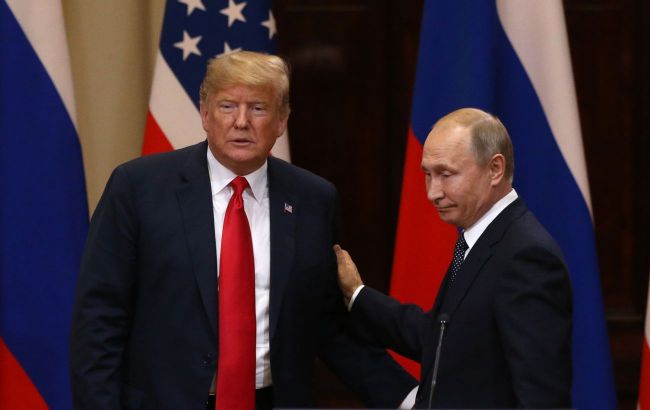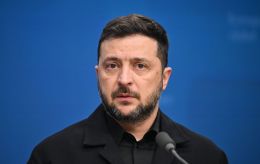Negotiations under fire: How Putin's attacks might derail Trump's peace plan
 Photo: Donald Trump will likely still face difficult interactions with Vladimir Putin (Getty Images)
Photo: Donald Trump will likely still face difficult interactions with Vladimir Putin (Getty Images)
After episodes of targeted terror and brief ceasefires, Russia has resumed large-scale strikes on Ukraine. The attacks come amid direct negotiations, a major prisoner swap, and rising expectations for the next phase of the peace process. In a comment to RBC-Ukraine, Volodymyr Fesenko, Chairman of the Board at the Center for Applied Political Studies "Penta," explained how this approach fits into Vladimir Putin’s strategy — and whether Donald Trump will respond effectively.
Why Putin is bombing Ukraine and pressuring negotiations through war
Since Donald Trump assumed the presidency, efforts have intensified to push forward the peace process. These attempts are often accompanied by concessions from the Ukrainian side, not the Russian one. In March, Ukraine agreed to an unconditional ceasefire. Russia did not. Two months later, even the Americans no longer insist on that arrangement.
Trying to show who is supposedly in charge, Putin resorted to targeted terror. The April ballistic missile strikes on Kryvyi Rih and Sumy, which killed dozens of civilians, angered Trump. After that, Moscow announced the Easter ceasefire, followed by a parade ceasefire. Then, it invited Ukraine to direct negotiations in Istanbul.
But right now, Ukrainian cities are suffering heavy attacks. Last week, the Russians launched a record number of strike drones — 273. On Monday, Putin told Trump he allegedly supports a peaceful resolution and is ready to work on a memorandum regarding a future ceasefire.
However, alongside the largest prisoner exchange of the full-scale war — the 1,000-for-1,000 prisoner swap — Kyiv came under intense shelling yesterday. Today, around 30 settlements were hit with ballistic and cruise missiles of various types. Russia also set a new drone record, using nearly 300.
According to political analyst Volodymyr Fesenko, Putin sees no contradiction in this negotiation strategy.
"Both in 2014, in 2015, and at the beginning of the full-scale war in 2022, there were negotiations. Putin always conducts negotiations under military pressure. He always does it this way — it's his style. For him, there is no contradiction. On the contrary, pressuring negotiations through war is, in his view, the most effective tactic," he said in a comment to RBC-Ukraine.
For example, direct talks don't stop Putin from launching a summer offensive. The reason is simple: this strategy has worked before, especially when he pushed through the Minsk agreements. Today, we need to understand that Putin is only negotiating through Trump.
"To make Ukraine accept capitulation and agree to his terms for ending the war. That's exactly what Moscow wanted in 2022, but it didn't work. Now the situation is roughly the same. Istanbul only confirmed this: either agree to unacceptable peace terms, or the war will continue and escalate. I think he told Trump more or less the same thing," the political analyst emphasized.
According to Fesenko, there is a popular theory among experts that Putin is trying to find a balance in his relationship with Trump. He wants to talk about ending the war, but not actually end it.
Will this strategy work for Trump, and will there be "hellish sanctions"?
The problem is that Trump himself may see no contradiction in this approach. For instance, he reacted with irritation when asked earlier about Russian strikes on Sumy during Palm Sunday. But only because Americans were outraged by the bloody attack during a religious holiday.
Fesenko notes that after this, Russia concluded that it needed to offer a ceasefire for Easter. And when the US President commented on a similar strike, he simply said, "It's a war."
"Should we expect the new attacks to affect him, and will he impose his 'hellish sanctions'? There will be no hellish sanctions. Trump wants to make a deal, and it's enough for him that Putin agreed to the large prisoner swap and will present his memorandum. The war will go on in parallel. Europe will apply pressure as much as it can. But nothing will fundamentally change after tonight," the political analyst said.
He emphasized that in the coming months, during summer and early fall, there will be talks, but no results. Instead, the situation at the front is likely to escalate. Right now, the focus should shift away from sanctions and toward restoring adequate US arms deliveries.
"I think we’re not facing hellish sanctions against Russia. We're facing a hellish summer. Putin's goal is to break us morally and psychologically. So we need to prepare not for the end of the war, but for its escalation," he added.
How else might Trump respond to Russian strikes on Ukraine?
At the same time, it would be wrong to say Trump is comfortable with Putin's actions. It's likely the US President has already realized that Putin does not want to end the war against Ukraine. Trump is trying to find a way out without appearing to lose.
"I think Trump is also adapting to the situation and looking for a balance of acceptable interests. He may insist that negotiations with Ukraine occur and that at least some prospect of ending the war remains. Although neither he nor his team had expected a quick resolution for a long time," the political analyst said.
When it comes to whether the American leader will support Ukraine with weapons, Fesenko sees no strong arguments against it.
"You have to understand that even if sanctions are tightened, that won’t force Putin to stop the war. However, if the war escalates, public opinion in the US will support resuming supplies. And Europe will come forward with corresponding initiatives. There's also an economic interest here, so why not? When we talk about resuming supplies, we mean either purchases on credit (under the minerals deal -ed..) or paid for by the Europeans," he noted.
Therefore, it is entirely possible that Trump may opt for the weapons option. Of course, the Russians will demand that arms deliveries stop if Ukraine wants a ceasefire. But in that case, Trump could say the weapons will stop flowing only if Moscow agrees to a ceasefire, not the other way around.
"In my opinion, weapons for Ukraine are the most effective factor to influence Putin. American weapons will not change the military situation and will not lead to our victory. But they will show that the Russians will no longer have a one-sided advantage, and their efforts to defeat Ukraine ultimately will be in vain," Fesenko added.
As a reminder, according to Bloomberg, European countries are indeed considering the possibility of buying American weapons in case President Donald Trump refuses to provide direct support to Ukraine.
Meanwhile, a recent US military intelligence report revealed that Vladimir Putin still seeks a military victory in Ukraine and is not ready to revise the goals of his so-called "special military operation."
In recent days, Western media have reported that Ukraine’s European partners fear Donald Trump may withdraw from efforts to end the war. This concern stems from his statements indicating that he does not consider sanctions against Russia a good idea, while Putin remains "convinced Russia was winning."

